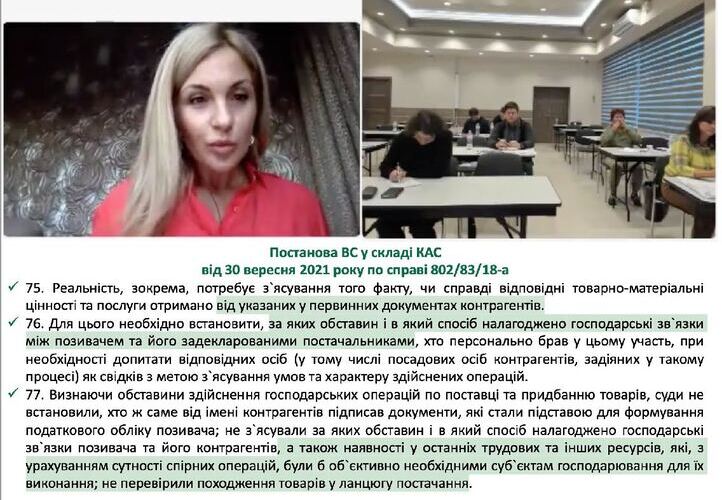Anna Vynnychenko conducted a business workshop “Tax Risks in Contract Work”
11.10.2021





Identifying and preventing tax risks in contract work is a crucial component of a successful business, especially given the partial lifting of the moratorium on tax audits, blocking of tax invoices, and the classification of businesses as high-risk taxpayers.
The tax authorities pay the most attention to business transactions documented using standard contract forms without considering the specific characteristics of a company’s activities or the particularities of a specific industry. For example, the specifics of contractual relations in the agricultural sector are quite different from those in construction, so the structure of marketing contracts will significantly vary depending on the industry.
In practice, the tax attorneys at our company frequently encounter negative consequences of poor contract management at the stage of a tax audit in the best-case scenario, or, more commonly, during the administrative or judicial appeal of tax reassessments related to such transactions.
Therefore, we periodically hold practical business events to spread awareness about the most common contract-related errors that lead to significant tax risks, and how they can be avoided from the start of business relations with counterparts.
On October 7, 2021, as part of our regular practice, the managing partner of WinnerLex law firm, Anna Vynnychenko, held a practical seminar on “Tax Risks in Contract Work – 2021” at the Business Club. The seminar addressed the following key issues:
- Contractual clauses and the proper procedure for checking counterparties.
- Counterparties. Presumption of good faith.
- A good-faith taxpayer is not liable for the actions of a counterparty (e.g., failure to file reports, non-payment of VAT…). Supreme Court. ECtHR.
- Requirements from tax authorities and the court for the documentation of business transactions: contracts, primary documents (proving the actual movement of goods to the correct party).
- The reality of transactions and fictitious counterparties: current audit practices and case law.
- Risk zones. Which transactions fall under “non-existent,” “fictitious,” “unreal,” “invalid,” “void.”
- How to properly conclude service contracts.
- Tax consequences of fictitious business operations.
- How intent is now proven.
- Court doctrines: “Business purpose,” “Proper tax diligence,” “Substance over form.”
- Cases of recognizing a transaction as unrealistic: discrepancies in the tax authority’s databases, forged signatures on documents, failure to provide tax reports, inability to conduct a counter-reconciliation, absence of a business at the location, lack of shipping documents, workforce, fixed assets, production facilities, warehouses, etc.
- Increased court attention to accounting data as evidence in contractual disputes.
- Proving in tax disputes. The principle of officialdom.
- Who has to prove the existence of tax violations?
- Can documents not reviewed during an audit be used in court?
- Requirements for the form of written evidence. Admissibility of means of proof: audit acts from other tax authorities, witness statements in criminal cases, tax information.
- Possibility of including responsibility in contracts for counterparties regarding tax reassessments, unregistered tax invoices.
- Prospects for recovering damages from tax authorities based on court rulings.
- Grounds and conditions for imposing penalties on sellers for failing to register tax invoices.
The active feedback and positive reviews from seminar participants once again highlight that tax risks are a significant concern for businesses, and the professional approach of tax attorneys is invaluable in contract management.
Our upcoming events with the Business Club will be held as follows:
- October 28, 2021 – “Tax Minimization, Optimization, and Planning”
- November 30, 2021 – “Tax Disputes 2021! Audits. Tax Control! Tax Offenses. SBU. Changes in 2021!”
